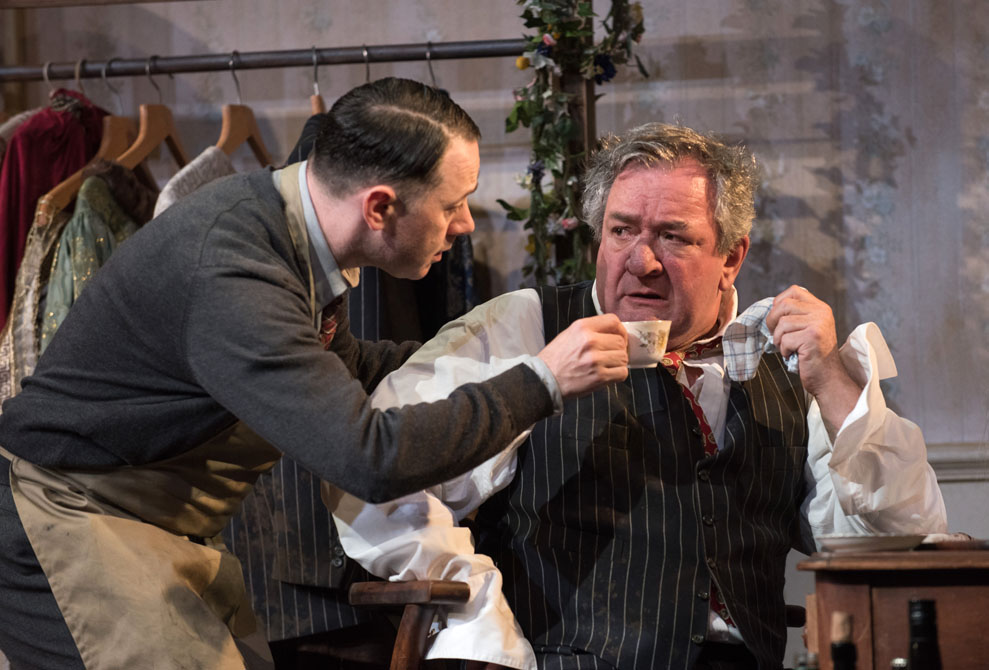
Audiences love back-stage dramas and musicals. They love a peek at the perceived glamour of being an actor, to glean a few dressing room secrets and to learn what goes on after the final curtain has fallen. But the glamour is an illusion and the secrets are traumatic, not titillating. In the old days backstage areas used to be dark, dingy places with dust and cobwebs in every corner and dressing rooms often without hot water. The actor’s life consisted of living and working in squalor for much of the time, of being badly paid, having no proper permanent home and constantly travelling the country in slow, smokey trains.
From Victorian times until the 1950s British theatre was the fiefdom of the actor-manager. From Henry Irving, through to John Gielgud and Laurence Olivier these theatrical patriarchs ruled their roosts with total power, producing, directing and appearing in plays. The domain of the actor-manager was usually the provinces where their companies would tour incessantly with Shakespeare and the other classics as their stock in trade. One of the last of these great theatrical characters was Sir Donald Wolfit who died in 1968.
Ronald Harwood worked as Wolfit’s dresser for several years and that experience inspired his 1980 play, although he claims that his characters are not based on the actual people with whom he worked.
Sir, we never learn his name, leads his motley crew around the provinces during the Second World War, giving his Valpone, Othello, Macbeth and other great classic roles. His loyal troupe sticks with him through thick, thin and the blitz. There is Madge his long-suffering stage-manager who is secretly in love with him, a cast of second-rate actors and Norman, his loyal dresser. But Sir is at the end of his tether and one night it looks as though he will not be turning up to play Lear, his signature role. He finally arrives at the theatre but all is not well and we witness his swift decline as the energy seeps from him.
Ken Stott gives a brilliant, virtuoso, heart-rending portrayal of a man’s disintegration before our eyes – but I’m not sure that man is Sir. I don’t think Stott was grandiose enough, not actoooory enough. But above all, his Scottish burr was not that of a great Shakespearean actor for whom every vowel and consonant would be grist to the mill of Thespis to be milked to the full – if I may mix my metaphors. Stott was more the washed-up music-hall performer and, to me, his Sir perhaps owed more to someone like Les Dawson than to Donald Wolfit. Actor-managers were larger than life characters for whom every waking moment was a performance and who would no doubt be happy to quote Hamlet while peeing in the dressing room wash basin. Nevertheless, Stott’s performance was a tour-de-force which I enjoyed enormously and was a privilege to see.
But The Dresser is, in fact, Norman’s play. Reece Shearsmith plays the faithful lackey who believes that he is the glue that holds Sir’s life together. He looks after him, makes sure his costumes are ironed and darned and washes his soiled underwear. Shearsmith’s performance as the camp retainer was spellbinding but again, I had certain reservations. Although I appreciate that Shearsmith would want to avoid clichéd stereotypes I think his Norman could have been a bit camper and, at the end, rather more bitter and spiteful – generally a bit bigger. But again, rather contradicting myself, this was a thoughtful and well-paced characterisation and the last scene, in which he discovers his true relationship to Sir, is tear-jerkingly pitiful.
The Dresser is a masterpiece, certainly by far Harwood’s greatest play, and also one that would have to rank high on any list of the best post-war British dramas. It is worth seeing for the quality of the writing alone. And while the aspects mentioned above do not strike quite the right note, this is a top quality production, visually exciting and with some outstanding performances – it is a must see. The audience were certainly on their feet for last night’s curtain call. ★★★★☆ Michael Hasted 28th September 2016
Production photos by Hugo Glendinning

